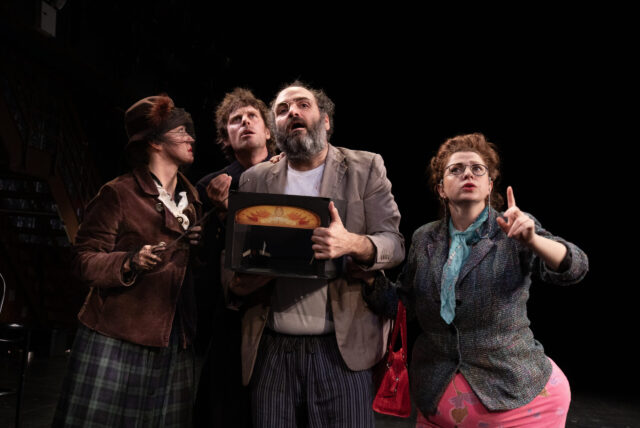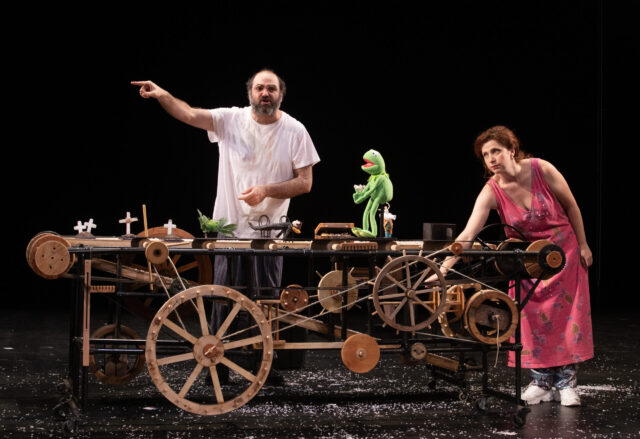
Four actors portray multiple characters in Pushkin “Eugene Onegin” in our own words (photo by Bronwen Sharp)
PUSHKIN “EUGENE ONEGIN” IN OUR OWN WORDS
BRIC Arts Media House
647 Fulton St., Brooklyn
Tuesday – Sunday through January 28, $52.11-$67.93
bricartsmedia.org
krymovlabnyc.com
This past October, Moscow-born director, designer, and visual artist Dmitry Krymov made a smashing debut with his new company, Krymov Lab NYC, in Big Trip, two shows that ran in repertory at La MaMa. I saw Three Love Stories Near the Railroad, wild and woolly, wholly unpredictable retellings of Ernest Hemingway’s “Hills Like White Elephants” and “A Canary for One,” followed by a pair of scenes from Eugene O’Neill’s Desire under the Elms. The other presentation was the oddly titled Pushkin “Eugene Onegin” in our own words, another strange but clever and gratifying journey that is enjoying an encore run through January 28 at BRIC Arts Media House as part of the Under the Radar festival.
In the hallway, you are told that this is a children’s show and that, in order to gain entry to the BRIC Ballroom, you need to select a puppet from among the dozens and dozens scattered around what would have been the coat check room. The handmade puppets, created by Leah Ogawa and Luna Gomberg, are adorably grotesque, made of papier-mâché and assorted random items that serve as eyes, ears, or limbs. You are expected to hold on to your child-puppet throughout the wild and woolly, wholly unpredictable proceedings, a hilarious ninety minutes of meta-theatrics.
Four actors — Inna Natanovna (Anya Zicer), Pyotr Naomovich (Jeremy Radin), Oleg Lvovich (Jackson Scott), and Alla Borisovna (Elizabeth Stahlmann) — walk on Emona Stoykova’s sparse stage dragging bags of goofy props that they lay out on a table on one side and a row of chairs on the other. Addressing the audience directly, Pyotr says, “Hello. We come tonight to explain you about Evgeny Onegin, a very famous narrative poem. A novel, made of many little poems, written by Alexander Pushkin — the most great, most wonderful, amazing, fantastic poet in all history of Russia. Greatest poet of all time. Your parents ask us, four old Russian immigrants, to tell you story about Onegin and Pushkin.”
And so they do, but definitely not as you might expect.

Pyotr Naomovich (Jeremy Radin) and Inna Natanovna (Anya Zicer) move along the plot in unique ways at BRIC (photo by Bronwen Sharp)
Inna, Pyotr, Oleg, and Alla portray themselves and multiple characters from “Evgeny Onegin” and Pushkin’s personal life. Some require more significant costume changes than others, and many of the outfits look like they might have come from the performers’ own closets. (The costumes are by Gomberg, with lighting by Krista Smith, sound by Kate Marvin, and projections by Yana Biryukova, all of which are purposely low-tech.)
In the 1830s novel in verse, Pushkin introduces readers to the title character, a dandy who inherits a country estate. The landowner’s daughter, Tatyana Larina, falls in love with Onegin, who has become friendly with poet Vladimir Lensky, who is about to marry Olga Larina, Tatyana’s younger sister. When Onegin and Olga dance together at a celebration, Tatyana and Vladimir are none too happy, and things devolve from there as Pushkin explores class, gender, naïveté, and unrequited love.
The story is regularly interrupted by a heckler (Kwesiu Jones), logistical issues, literary arguments, and tangents about the art of theater itself, some of which involve “stage manager” Natalie Battistone. As Pyotr explains at one point, “From the traproom, you can rise and fall! This trick is often used in opera and ballet performances by devils! But we don’t talk about devils. Very superstitious people, theater people, ptew! No devils — we don’t want to give you nightmares, okay? We tell you, instead, about angels. . . .”
Several audience members in the first row are asked to participate. The actors keep a feather afloat by blowing on it for no apparent reason. Onegin’s spleen (depression) is examined. One of the men becomes the lower half of a ballerina’s body. A pair of oddball contraptions are employed to elucidate characters’ motivations. Onegin is compared to Pushkin. Clothes come off, revealing an unexpected surprise. A buxom nanny opens a window, then closes it, then opens it, then . . .
Writer-director Krymov was preparing a production of The Cherry Orchard in Philadelphia in February 2022 when Russia invaded Ukraine. Condemning Vladimir Putin’s actions, he became an exile, moving to New York City with his wife and starting Krymov Lab NYC. If these first two vastly inventive and entertaining shows are any indication of what is to come, Putin has cost Russia something very valuable indeed.
[Mark Rifkin is a Brooklyn-born, Manhattan-based writer and editor; you can follow him on Substack here.]